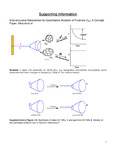Size-Exclusive Nanosensor for Quantitative Analysis of Fullerene C60

View/
Date
2011-05-18Author
Kikandi, Samuel N
Okello, Veronica A
Wang, Qiong
Sadik, Omowunmi A
Varner, Katrina E
Metadata
Show full item recordAbstract
This paper presents the first development of a mass-sensitive nanosensor for the isolation and quantitative analyses of engineered fullerene (C60) nanoparticles, while excluding mixtures of structurally similar fullerenes. Amino-modified beta-cyclodextrin (β-CD-NH2) was synthesized and confirmed by 1HNMR as the host molecule to isolate the desired fullerene C60. This was subsequently assembled onto the surfaces of gold-coated quartz crystal microbalance (QCM) electrodes using N-dicyclohexylcarbodiimide/N-hydroxysuccinimide (DCC/NHS) surface immobilization chemistry to create a selective molecular configuration described as (Au)-S-(CH2)2-CONH-beta-CD sensor. The mass change on the sensor configuration on the QCM was monitored for selective quantitative analysis of fullerene C60 from a C60/C70 mixture and soil samples. About ∼1014–1016 C60 particles/cm2 were successfully quantified by QCM measurements. Continuous spike of 200 μL of 0.14 mg C60 /mL produced changes in frequency (−Δf) that varied exponentially with concentration. FESEM and time-of-flight secondary–ion mass spectrometry confirmed the validity of sensor surface chemistry before and after exposure to fullerene C60. The utility of this sensor for spiked real-world soil samples has been demonstrated. Comparable sensitivity was obtained using both the soil and purified toluene samples. This work demonstrates that the sensor has potential application in complex environmental matrices.
